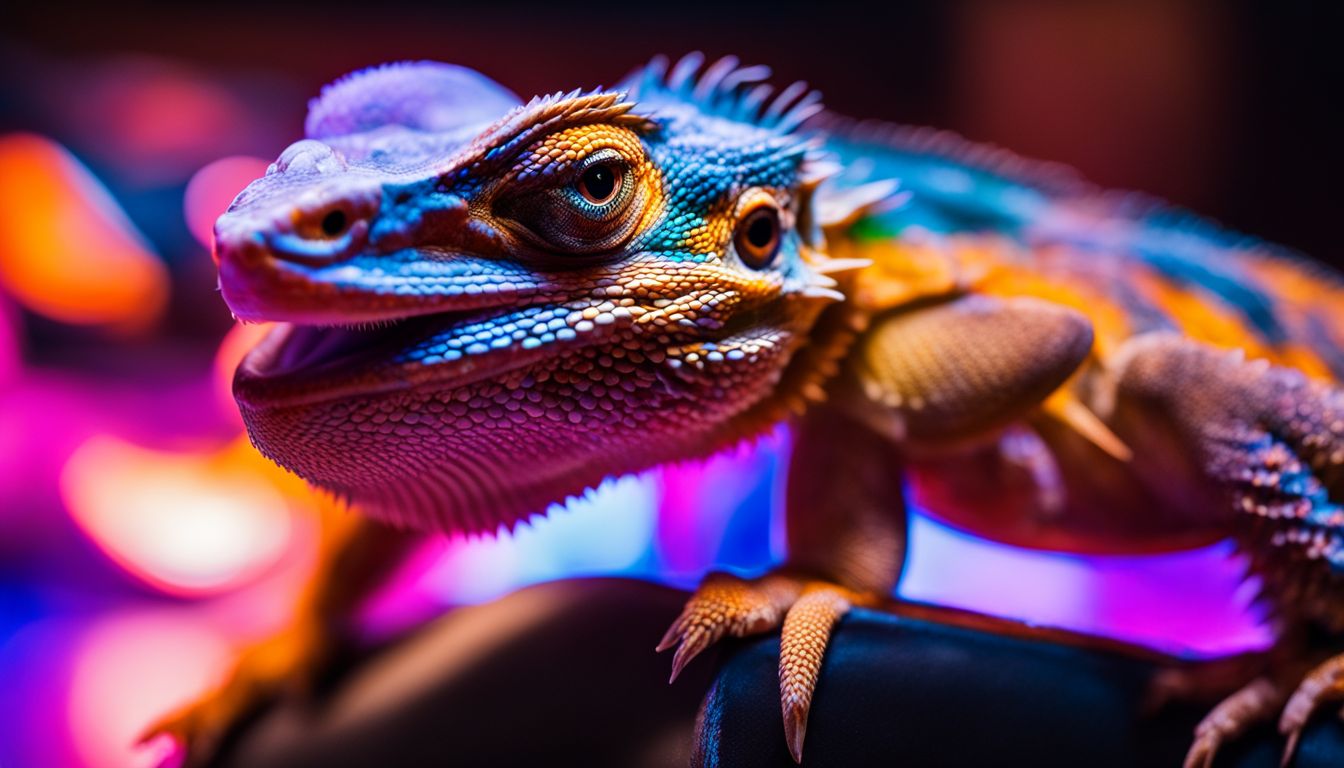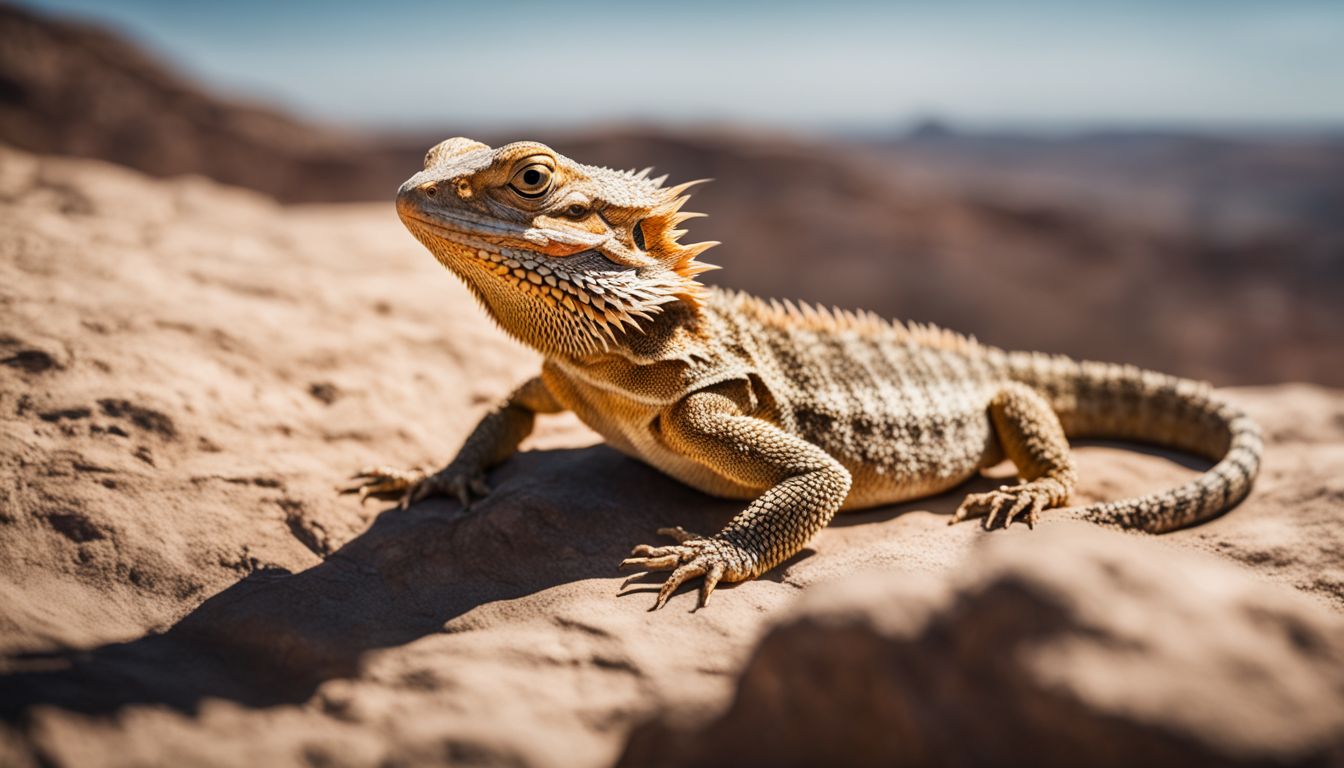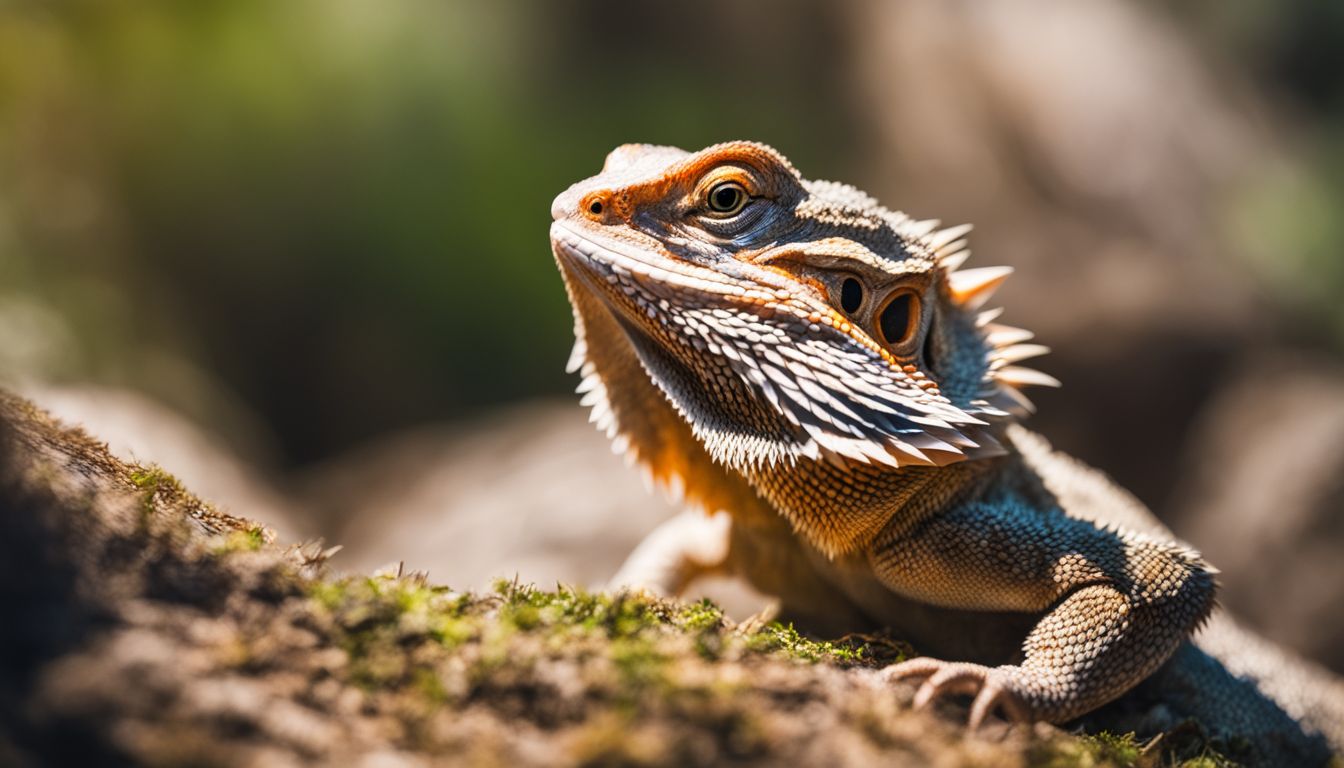Noticing your bearded dragon‘s neck looking swollen? You’re not alone. This is a common issue that can stem from various causes, ranging from normal behaviors to potential health concerns.
Our article offers clear, step-by-step guidance on identifying the reason behind the swelling and how to address it effectively. Keep reading for insights and solutions!
Understanding a Bearded Dragon’s Neck Swelling

A swollen neck in your bearded dragon can ring alarm bells, but don’t panic yet. This swelling could signal a range of issues, from the benign to the more serious. At its heart, understanding this symptom means diving into both everyday causes and health-related concerns that might be at play.
For instance, normal behaviors like shedding or puffing up when threatened are harmless reasons behind such swelling. On the flip side, it could hint at underlying problems such as a respiratory infection or vitamin imbalance leading to fluid retention.
Knowing when to worry hinges on observing other signs and considering the context of the swelling. If your pet shows no distress and eats well, they’re likely just going through their natural processes.
However, if you spot signs of discomfort or illness—like difficulty moving or changes in behavior—it’s time to delve deeper into potential health-related causes like abscesses or infections.
Moving forward will explore what these normal and concerning reasons entail more closely.
Normal Reasons for a Bearded Dragon’s Swollen or Puffy Neck

– Shedding is a normal cause of puffiness in your bearded dragon’s neck. – Providing essential nutrients and minerals, the fat pads on their necks help them store energy and regulate body temperature.
Shedding
Bearded dragons often experience a puffed or swollen beard and bulging eyes as signs they’re ready to shed. This is a natural process where they get rid of old skin to make way for new, healthier layers.
Just like us needing to change out of tight clothes, bearded dragons need to shed their skin for growth and comfort. It’s one of the normal reasons why you might notice your pet’s neck looking swollen or puffy.
During the shedding process, it’s not just the body that sheds; the skin around their neck becomes loose too. You might see them rubbing against objects more frequently – this helps in removing the old skin.
Understanding this behavior is key to recognizing that a swollen neck during these times is typically nothing to worry about. Shedding is an essential part of bearded dragon health, ensuring they continue thriving under your care.
Storing Snacks
Just as shedding is a part of their natural cycle, bearded dragons also engage in storing snacks in their necks. This fascinating behavior is not just quirky; it’s a survival strategy.
By tucking away food in their swollen or puffy necks, these reptiles ensure they have access to nourishment when needed. It’s a smart move, considering the unpredictable availability of food in their natural habitats.
This snack storage might catch novices off guard—seeing a reptile with an unusually swollen neck can be alarming at first. Yet, understanding this aspect of bearded dragon behavior highlights how adaptable and resourceful these creatures are.
It’s all about making sure they don’t go hungry later on—a neat trick for surviving tough times!
Feeling Threatened
When your bearded dragon feels threatened, it may display defensive behavior, such as puffing up its neck. This is a normal response to feeling intimidated or agitated due to perceived threats from other pets, unfamiliar surroundings, or even during interactions with humans.
It’s important to recognize these signs of feeling threatened in your pet and provide a calm and secure environment.
Defensive displays like neck swelling when feeling threatened are natural behaviors for bearded dragons. These behaviors can indicate warning postures or territorial instincts. Understanding and respecting their need for space when they feel defensive is crucial in maintaining their well-being and reducing stress levels.
Health-Related Causes of Neck Swelling in Bearded Dragons
Obesity, infections, and inadequate UVB lighting can cause neck swelling in bearded dragons. Learn how to identify and address these health issues for your pet’s well-being.
Abscess or Infection
Abscesses in bearded dragons can appear as hard tumor-like swellings due to infected tissue accumulation. These may occur anywhere on the body, including the neck. In reptiles, abscesses generally form from infections, leading to a buildup of white blood cells in the infected tissue.
It’s crucial for caregivers to observe any unusual lumps and get veterinary assistance promptly if they notice such swelling.
Adenovirus infection in bearded dragons might result in inflammatory swellings within the gastrointestinal tract. Along with this, other health-related causes of neck swelling could include overweight issues or insufficient UVB lighting affecting their overall well-being.
Overweight
If a bearded dragon is overweight, it can lead to a swollen neck. Obesity in these reptiles is often caused by overfeeding or an improper diet. As responsible pet owners, it’s crucial to monitor and manage the weight of your bearded dragon to prevent health issues like neck swelling.
Be mindful of their diet and ensure they are getting enough exercise to maintain a healthy weight.
Improper weight management may result in obesity which has been linked to neck swelling in bearded dragons. Overfeeding and an unbalanced diet are common culprits for this issue.
Insufficient UVB lighting
Insufficient UVB lighting leads to vitamin D3 deficiency in bearded dragons, causing health issues like neck swelling and weakened bones. Signs of inadequate UVB lighting include jaw swelling and softening of the neck.
Abscesses or infections may develop due to insufficient UVB exposure, affecting their overall health. Proper UVB lighting is vital for nutrient absorption and calcium metabolism in bearded dragons, preventing metabolic bone disease and other health concerns.
This makes it essential to provide adequate UVB exposure for your pet’s overall well-being. Next up, let’s delve into treatment options for swollen necks in bearded dragons..
Treatment Options for Swollen Neck in Bearded Dragons
Consult a veterinarian for professional assessment and guidance on treating your bearded dragon’s swollen neck.. A proper diet, exercise, and ensuring adequate UVB lighting are key in the treatment of neck swelling in bearded dragons.
Veterinary Consultation
Seeking a reptile veterinarian’s expertise is essential for addressing a bearded dragon’s swollen neck. A vet can provide a thorough assessment, diagnose the underlying cause, and recommend appropriate treatment options.
Early intervention through veterinary consultation increases the likelihood of successful outcomes and minimizes potential complications.
Remember, obtaining professional care from an experienced reptile veterinarian plays a critical role in ensuring the well-being of your bearded dragon. It’s important to schedule regular health check-ups with a knowledgeable exotic animal veterinarian to maintain your pet’s optimal health and address any concerns promptly.
Proper Diet and Exercise
Bearded dragons require a balanced diet consisting of 90% vegetables and 10% animal matter. Providing gut-loaded insects high in calcium and vitamins, along with occasional treats like blueberries and cantaloupe, ensures their nutritional needs are met.
Exercise is essential for bearded dragons to maintain a healthy weight and prevent neck swelling. Encouraging movement by offering climbing structures or supervised time outside their habitat promotes physical activity.
To keep your bearded dragon in optimal health, focus on providing a well-rounded diet and opportunities for regular exercise. Ensuring these elements will greatly contribute to preventing neck swelling and maintaining overall well-being for your pet reptile.
Ensuring Adequate UVB Lighting
Bearded dragons need strong UVB lighting to stay healthy. They require exposure to UVB light for about 12 hours each day. Proper UVB lighting is crucial as it helps prevent calcium deficiency and other serious health issues in bearded dragons.
To ensure adequate UVB lighting, make sure their enclosure has a gradient of UVB exposure, with the highest amount at the basking spot. The best UVB lights for bearded dragons should provide sufficient radiation in the range of 290-320 nanometers.
To thrive, these reptiles need a high basking temperature alongside proper UVB lighting. Lack of this may result in refusal to eat and could signal insufficient UVB exposure in their environment – a clear indication that appropriate measures need to be taken concerning their UVB needs..
How to Prevent Neck Swelling in Bearded Dragons
– Regular health check-ups are crucial to monitor any developing issues in your bearded dragon’s neck.
– Ensuring a balanced diet and providing adequate UVB exposure will help maintain your bearded dragon’s overall health.
Regular Health Check-ups
Regular health check-ups are crucial for preventing neck swelling and other health issues in bearded dragons. These routine examinations help in early detection of any potential problems, allowing prompt veterinary care to improve the overall health and wellness of your pet.
It is important to prioritize regular vet visits to ensure the good health and wellbeing of your bearded dragon, preventing serious illness and addressing any concerns as they arise.
Maintaining the good health of your bearded dragon includes identifying and addressing any health issues promptly, enhancing their overall quality of life. By staying proactive with routine health check-ups, you can prevent neck inflammation and other potential problems before they become more severe, ultimately ensuring the longevity and vitality of your beloved pet.
Balanced Diet
Bearded dragons need a balanced diet to stay healthy. Their food should contain more calcium than phosphorus, especially when they’re young and their bones are still growing. Young bearded dragons have different dietary needs than adults, with juveniles requiring a specific diet.
It’s crucial to feed them 90% vegetable matter and 10% animal matter as part of their regular diet.. This will help prevent health issues such as neck swelling and metabolic bone disease.
A proper diet for bearded dragons includes gut loading insects with calcium-rich foods and dusting them with supplements. Providing the right combination of vegetables and animal matter is essential for preventing health problems in these reptiles..
Adequate UVB Exposure
Be sure your bearded dragon gets enough UVB exposure for good health. Without it, they can’t absorb calcium properly. This could lead to serious issues including metabolic bone disease (MBD).
Bearded dragons need the right amount of UVB light in their living space for their well-being.
Recognizing Other Symptoms Related to Neck Swelling
Look for changes in behavior, loss of appetite, and difficulty in movement – understanding these signs is crucial for the well-being of your bearded dragon. For more information on how to identify and address these symptoms, keep reading!
Changes in Behavior
A swollen neck in bearded dragons can cause changes in behavior. Keep an eye out for disinterest in food, loss of appetite, signs of pain, discomfort, or a black beard. Sluggish behavior may also indicate neck swelling.
If you notice any of these symptoms, it’s essential to seek veterinary assistance promptly.
Be observant of your bearded dragon’s actions and how they differ from their normal behavior to catch potential issues early on. These changes could signal underlying health problems that need attention to ensure your pet’s well-being.
Loss of Appetite
A bearded dragon showing reduced food intake or a lack of hunger may indicate an underlying issue related to their swollen neck. This decreased appetite is a key symptom associated with recognizing other symptoms linked to neck swelling, signaling that your pet might need medical attention.
Stress can also lead to loss of appetite in bearded dragons, along with additional signs such as diarrhea and reluctance to bask.
Recognizing changes in your bearded dragon’s eating habits is crucial when addressing potential health concerns related to neck swelling. If you notice a significant decrease in food consumption, paired with other unusual behaviors, it’s essential to seek veterinary assistance promptly.
Difficulty in Movement
Bearded dragons experiencing neck swelling may show difficulty in movement, such as impaired walking or lack of coordination. Mobility issues could include trouble walking normally, gait abnormalities, or hindered locomotion.
These challenges in moving around can be indications of an underlying health problem and should prompt immediate attention to ensure the well-being of your pet reptile.
Recognizing other symptoms related to neck swelling is essential, including changes in behavior and loss of appetite. Additionally, impaired movement indicates a potential health concern that requires proper assessment and treatment to restore normal functioning for your bearded dragon.
Understanding Other Beard and Neck Related Conditions in Bearded Dragons
Beard Infection and Fluid Accumulation are common conditions in bearded dragons.. Understanding and recognizing these issues can help ensure your pet’s well-being.
Beard Infection
Bearded dragons can develop beard infections, which often present as dark discoloration or swelling in the throat area. These infections are typically caused by bacteria, and they can lead to discomfort and difficulty swallowing for your pet.
Signs of a beard infection may include loss of appetite, lethargy, or unusual behavior. If you notice any of these symptoms in your bearded dragon, it’s crucial to seek veterinary assistance promptly to determine the cause and receive appropriate treatment.
Additionally, maintaining a clean environment and providing proper nutrition can help prevent beard infections in bearded dragons.
Fluid accumulation under the skin around the neck area can also contribute to discomfort and reduced mobility for your pet. This is often associated with abscesses or injuries subsequently leading to inflammation in the surrounding tissues.
Fluid Accumulation
After discussing the potential issues related to beard infection, it’s crucial to understand another concerning condition that can affect bearded dragons – fluid accumulation. Fluid accumulation in bearded dragons may occur for various reasons, including infections or other health issues.
This type of swelling is different from the puffing seen during aggressive displays and should be addressed promptly.
Fluid accumulation in a bearded dragon’s neck can indicate a serious health problem, such as an abscess or bacterial infection. Additionally, it signifies a need for medical attention and proper evaluation by a reptile veterinarian with expertise in treating these types of conditions.
Beard Puffing In and Out
Beard puffing in and out, along with other abnormal behaviors like wobbly walking and lethargy, can signal discomfort or feeling threatened in bearded dragons. It may also indicate underlying health issues such as metabolic bone disease or abscesses.
Swelling in the jaw or hind limbs could point to diseases like metabolic bone disease, so monitoring your bearded dragon’s body language and behavior is crucial for catching potential health concerns early.
Noticing any signs of discomfort, changes in movement, or unusual beard puffing should prompt a closer look at your bearded dragon’s overall well-being. Regular health check-ups can help catch these issues early, ensuring that your pet receives timely veterinary care when needed.
FAQs
Is it typical for a bearded dragon’s neck to swell? How can the swelling be reduced? When should veterinary assistance be sought?
Is it normal for a bearded dragon’s neck to swell?
A bearded dragon’s neck may swell due to shedding, storing snacks, or feeling threatened. It could also indicate health issues like abscesses, respiratory infections, or vitamin imbalances.
If the swelling is sudden, it may signify a serious condition such as fluid retention from an underlying illness. Keep an eye on other symptoms and seek veterinary assistance promptly if you notice any concerning signs to ensure your pet’s well-being.
Understanding these causes can help in identifying and addressing any potential concerns for your bearded dragon’s health. Regular check-ups at the vet and ensuring a balanced diet and proper lighting are essential steps you can take to keep your pet healthy and prevent neck swelling in the future.
Look out for changes in behavior or difficulty in movement as these might signal more significant health issues requiring immediate attention.
How can I reduce the swelling?
To reduce the swelling in your bearded dragon’s neck, start by giving it a warm bath. This can help decrease inflammation and provide relief while also aiding in rehydration. Supportive care and soaks are essential to ease swelling, and once the reptile is adequately hydrated, antibiotic therapy can be administered to address the underlying cause of the puffiness.
Seeking veterinary assistance is crucial for proper diagnosis and treatment of your bearded dragon’s swollen neck. Additionally, ensuring that your pet has an appropriate core body temperature plays a critical role in reducing bulging or edema in its neck region.
Alleviating puffiness through these steps will aid in minimizing discomfort and promoting your bearded dragon’s well-being.
When should I seek veterinary assistance?
If your bearded dragon’s neck is swollen, especially if it’s the only symptom present, seek veterinary assistance promptly. Swollen necks in bearded dragons can indicate serious health issues that require professional evaluation and treatment.
It’s important to address the issue early to ensure the well-being of your pet.
Remember, giving supportive care and soaks might help alleviate some symptoms, but these do not replace the necessity of seeking veterinary assistance for proper diagnosis and treatment.
Conclusion
If your bearded dragon displays neck swelling, swift action is essential. Veterinary consultation is crucial to identify and address the underlying cause. Implementing proper diet, exercise, and UVB exposure can aid in prevention.
Regular health check-ups ensure early detection of any issues. Stay vigilant for related symptoms to maintain your pet’s well-being.
FAQs
1. What causes a bearded dragon to have a swollen neck?
A swollen neck in a bearded dragon can indicate health issues such as an abscess, infection, or impaction.
2. How can I help my bearded dragon with a swollen neck?
Ensure proper temperature and humidity levels in the habitat, provide access to clean water, and seek veterinary care promptly.
3. Can I use over-the-counter remedies for my bearded dragon’s swollen neck?
It is not recommended to use over-the-counter remedies without consulting a reptile veterinarian first.
4. What are the signs that indicate my bearded dragon needs immediate veterinary attention for its swollen neck?
Signs include lethargy, loss of appetite, difficulty breathing, or if the swelling worsens rapidly.
5. Are there preventive measures to avoid a bearded dragon developing a swollen neck?
Maintain good hygiene in the enclosure, provide balanced nutrition, and schedule regular check-ups with an experienced reptile veterinarian to prevent potential health issues.




